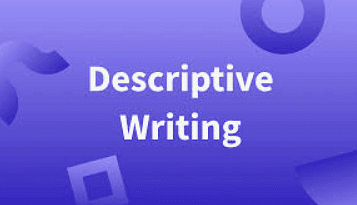Choosing vocabulary for effect in descriptive writing | Year 7 English (Cambridge) - Class 7 PDF Download
| Table of contents |

|
| Descriptive Writing |

|
| Components of Effective Descriptive Writing |

|
| Brainstorming for Descriptive Writing |

|
| Tips for Descriptive Writing |

|
Descriptive Writing
Descriptive writing is a style of writing that paints a vivid picture of a person, place, animal, or object in the reader's mind. Instead of merely telling the reader what something looks like, feels like, or sounds like, descriptive writing shows these details through careful choice of words.
Example of Descriptive Writing
Let's look at an example:
"The cool evening wind moaned, toying with the tiring tree branches. Leaves tumbled off the tiled roof and fell to the ground, burying the yard under a patchwork quilt of yellow and brown. A curious squirrel scampered down the trunk and disappeared into a rustle of leaves."
Notice how this example 'shows' the reader it's windy and that it's autumn, rather than simply stating these facts.
Components of Effective Descriptive Writing
Attention to Details
Descriptive writing pays close attention to small details. Instead of just seeing a red apple, descriptive writing might mention the stem, the changing color, the spots on the skin, and how it catches the light.
Examples from the text:
- "tiled roof"
- "patchwork quilt of yellow and brown"
Descriptive Language
Strong descriptive writing uses vivid verbs and precise adjectives.
- Vivid Verbs: These verbs allow the reader to clearly picture the action. They are more interesting than average verbs.
- Example: Instead of 'break', use 'shatter', 'fracture', or 'smash'.
- Example: Instead of 'walk', use 'hike', 'shuffle', or 'stroll'.
- Precise Adjectives: These adjectives are very specific and accurate in their description.
- Instead of using multiple average adjectives, choose one precise adjective. Quality over quantity.
Examples from the text:
- Vivid Verbs: "moaned", "tumbled", "burying"
- Precise Adjectives: "curious", "tiring"
Using Multiple Senses
Descriptive writing should engage multiple senses, not just sight. It can describe what the reader could feel, hear, taste, and smell.
Examples from the text:
- Sight: "Tree branches", "tiled roof", "yellow and brown" leaves.
- Hearing: "The wind moaned", "rustle of leaves".
- Feeling: "cool wind", "tiring tree branches".
Organisation
Descriptions should be organized logically. They can be arranged chronologically (by time), by order of importance, or spatially (focusing on one part and then moving to another).
Example from the text:
- The description starts at the top of the tree (branches) and moves down to the ground where the squirrel is.
Brainstorming for Descriptive Writing
When starting descriptive writing, brainstorm verbs and adjectives to use.
- Example Verbs: stretched, reached, hung, floated, drifted, meandered, perched, stood, blew
- Example Adjectives: long, rickety, wooden, secluded, peaceful, calm, tranquil, soft, gray, blue
Including Multiple Senses
- Hearing: The sound of the water lapping against the pier.
- Smell: A scent carried on the breeze.
- Taste: The taste of salt in the air.
Tips for Descriptive Writing
- Limit the use of 'to be' verbs: ('is', 'are', 'was', 'were').
- Set a word limit: This encourages concise and meaningful writing. Remove any word or sentence that isn't doing an important job.
- Include the five senses creatively: Even if it’s difficult to describe taste, use words that evoke taste to describe other aspects.
- Example: Instead of saying "The clouds were gray," you could say "The clouds were the color of grapes," which evokes both the color and the taste.
|
31 videos|12 docs|10 tests
|
FAQs on Choosing vocabulary for effect in descriptive writing - Year 7 English (Cambridge) - Class 7
| 1. How does choosing the right vocabulary enhance descriptive writing? |  |
| 2. What are some tips for selecting impactful words in descriptive writing? |  |
| 3. Why is it important to consider the effect of vocabulary in descriptive writing? |  |
| 4. How can a writer create a strong imagery through vocabulary in descriptive writing? |  |
| 5. What role does vocabulary play in setting the tone and mood of descriptive writing? |  |



















